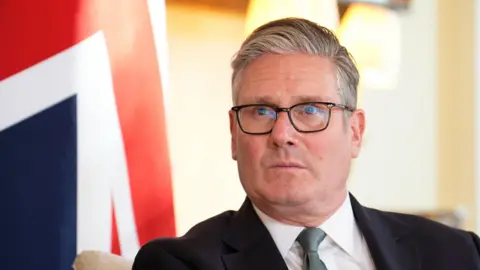Starmer calls for Iran to return to negotiating table
 PA Media
PA MediaSir Keir Starmer has called on Iran to "return to the negotiating table" after the US bombed nuclear sites in the country overnight.
The UK prime minister described Iran's nuclear programme as "a grave threat to international security" in a statement, adding stability in the region was the priority.
Following the strikes, Business Secretary Jonathan Reynolds told the BBC the UK supported "the prevention of the Iranian regime obtaining nuclear weapons" because the Iranians were "not willing to go along with" diplomatic efforts.
He confirmed there was no UK involvement in the US strikes on Iranian nuclear facilities and that the prime minister was informed of them in advance.
The US said it had carried out strikes on three nuclear facilities in Iran: Natanz, Isfahan and Fordo on Saturday night.
Reynolds told BBC's Sunday with Laura Kuenssberg the UK "supports, and always has done, the prevention of the Iranian regime obtaining nuclear weapons".
Although the UK had "wanted" a peaceful de-escalation, he said the "Iranians were not willing to go along with that".
Stopping short of welcoming the strikes, Reynolds said: "I wanted a different way to obtain this but I cannot pretend to you that prevention of Iran having a nuclear weapon is anything other than in the interests of the UK".
Pressed on whether there was a parallel with the Iraq war and if there was any legal advice on attacks, Reynolds said: "This is very different to what we saw with the invasion of Iraq."
Stressing Iran was "a threat to this country, not in an abstract way, not in a speculative way" Reynolds said there was "simply no way a responsible British government would ever allow that country to possess nuclear weapons".
He continued: "Iran didn't listen to the diplomatic calls for a peaceful solution.
"That was a mistake -- they should return to the negotiating table."
Iran has claimed its nuclear ambitions are peaceful and recent uranium enrichment to 60% was done as part of a research and development programme.
However, the International Atomic Energy Agency's (IAEA) latest report warned that Iran had amassed enough enriched uranium to potentially make nine nuclear bombs, which was "a source of legitimate concern".
Iran's ambassador to the UK, Seyed Ali Mousavi, told the same programme that there was "no doubt" the US attack " is a violation of the UN charter" and Iran is considering the "quantity and quality" of its reaction with regards to retaliation.
Asked why Iran needed uranium enriched to near weapons-grade, Mousavi insisted: "There's no intention from our side to go into a military attack."
On returning to negotiations, he said "it's our strong desire to have diplomacy" but also stressed that "Netanyahu destroyed this diplomacy" and Iran was "defending" itself from attack "according to the UN charter".
• Follow latest: US bombs three nuclear sites in Iran
• What we know about US strikes on Iran's nuclear facilities
Israeli President Isaac Herzog told Kuenssberg that Iran's nuclear programme had been hit "substantially" but added that he did not yet know the exact details of what happened overnight.
"[The US attacks] come in addition to the Israeli strikes throughout the week which were vital and important in respect to this threat [from Iran]," he said.
The strikes followed the launch of a new Israeli operation against Iran overnight into 13 June. Israel said its targets were military sites, including nuclear facilities.
Iran launched retaliatory strikes - with the two countries continuing to exchange fire since.
President Donald Trump had initially refused to say whether the US would get involved, with the White House saying on Friday that a decision would be made "within the next two weeks".
In a televised address following the strikes, the president said the operation was a "spectacular military success", adding that if Iran did not make peace quickly it would face "far greater" attacks.
No increase in off-site radiation has been reported, according to the UN's International Atomic Energy Agency (IAEA) latest update.
Iran's foreign minister Seyed Abbas Araghchi called the US strikes "outrageous" and said they would have "everlasting consequences".
"Each and every member of the UN must be alarmed over this extremely dangerous, lawless and criminal behavior," he added.
UN Secretary General António Guterres said the overnight strikes were a "dangerous escalation".
Reacting to the US action overnight, Conservative leader Kemi Badenoch, said: "By targeting Iran's nuclear sites, the US has taken decisive action against a regime that fuels global terror and directly threatens the UK."
Liberal Democrat leader Ed Davey said it was now "essential" for the UK to "de-escalate the conflict and achieve that diplomatic solution".
Starmer has previously urged for further negotiations in a bid to de-escalate the conflict.
"The risk of escalation in the region is obvious," he said at the time.
Foreign Secretary David Lammy travelled to Washington last week to meet Secretary of State Marco Rubio and US special envoy Steve Witkoff.
The foreign secretary said after the meeting: "We discussed how a deal could avoid a deepening conflict. A window now exists within the next two weeks to achieve a diplomatic solution."
He formed part of a European contingent which met with Iranian officials on Friday.
The Foreign, Commonwealth and Development Office (FCDO) has advised against all travel to Israel and the Occupied Palestinian Territories and Iran.
